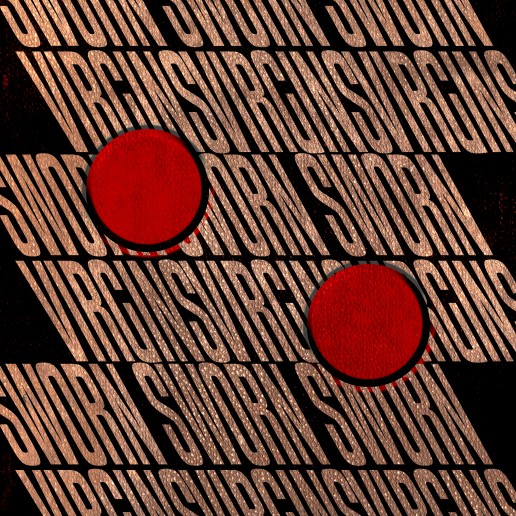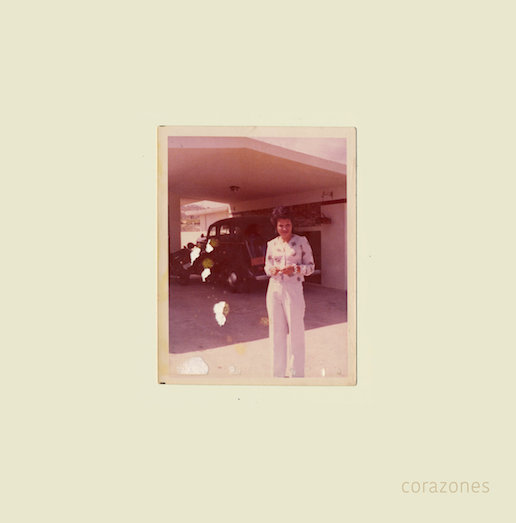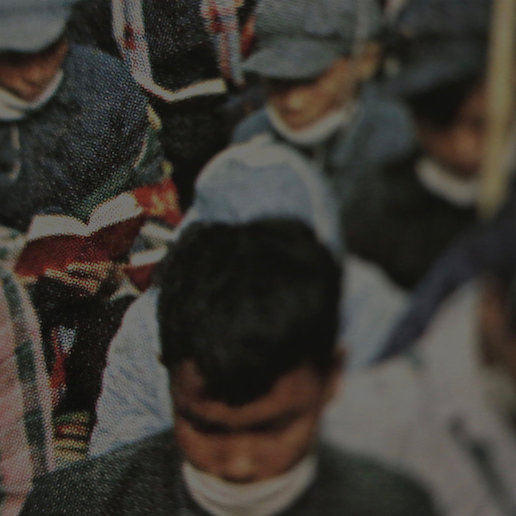Despite involvement with some of the most influential guitar bands of the last twenty years, and with myriad solo releases and collaborative works undertaken in a productivity spurt since 2004 that ridicules the notion of a two-year release cycle, Omar Rodríguez-López cuts a slightly divisive figure. Accusations of onanism regarding his output, that ‘he needs an editor’, frankly miss the point: when you’re putting out five records a year, there should be room for experimentation, for making necessary and vital mistakes, for following curiosity and being self-indulgent. Indulgence is another accusation often levelled (like it’s a bad thing) at Rodríguez-López, but with analysis, it’s hard to see the purpose of any truly expressive creative process besides indulgence of the self.
But since erstwhile prog-overlords The Mars Volta fizzled out in 2012, you may be forgiven for wondering what the once prodigious Rodríguez-López had been up to. A low key self-release for pop-pastiche/nostalgia-indulgence Antemasque was perhaps more group therapy for Rodiguez-Lopez and Mars Volta vocalist Cedric Bixler-Zavala following their unsightly and regrettably public statements regarding each other as Volta dissipated. I haven’t got much sympathy for the manner in which that great band fell apart: years of miscommunication and unresolved tensions have been cited by various former members, but at this point it feels like exhuming a body for autopsy long past the point which anyone has a vested interest. But I will gladly put a case together for arguing that despite a career built from endurance-testing concept albums and a reputation as one of the most visceral and synchronous live groups (through various incarnations and substantive line-up differences), The Mars Volta never quite fulfilled their potential.
You’d be forgiven as well for having missed Bosnian Rainbows, the 80s new wave influenced ‘democracy and broccoli’ (democalli? Brococracy?) project borne in Volta’s ashes with motorik beat and avant-garde producer Deantoni Parks (who had played with Mars Volta briefly in ’06, rejoining for the group’s final album Noctourniquet, and who recently put in a stunning shift on Flying Lotus’s conceptual work You’re Dead) new wave synth ‘educator’ Nicci Kasper (who played with Parks in both Kudu and Dark Angels – whose ongoing remix projects are a delight) and Teri Gender Bender of Mexican garage-punk outfit Le Butcherettes, who had previously collaborated with Rodríguez-López’ on the Octopus Kool-Aid album. Their debut album was perhaps rushed to release; and the recorded songs never quite achieved the same lift or gravitas that they found on the road over the subsequent months.
The elephant in the room, the “old t-shirt that doesn’t fit anymore” to quote a Rodríguez-López interview from 2012 (and at this point, you’d think the biggest draw) At The Drive-In “reignited” unexpectedly with the promise of “new music this year”. They’ve toured for most of 2016, embedding new guitarist Keeley Davis, breaking Bixler Zavala’s vocal chords and their (righteous) anti-crowd-surfing rules as they went. At The Drive-In have spent some time in the studio this year, as evidenced by various Instagram posts, but their next recorded statement seems some while off. A second Antemasque LP, Saddle On The Atom Bomb, with the year 1999’s Travis Barker (‘member All the Small Things? I ‘member?) is despite a spate of promising US concerts last year and the production of a music video (again, Instagram posts), also yet to surface.
If that’s all worded as a rather harsh appraisal of where we were at with Omar’s creative output, then perhaps it’s meant to be. Although it’s hard to be critical of anyone engaging in this much creative work, collaborating with so many talented musicians, working in vastly different fields, it’s a frustration borne of undelivered promise – that we’d rather see releases and listen to actual music than engage with social media updates and cryptic promises of releases that for whatever reason, haven’t materialised yet. Perhaps it’s also a sign of contemporary anxiety and impatience that I’m demanding of these artists, but if you’re trying to alleviate and reign in a demanding fanbase, you don’t tease them with endless cryptic updates about ghost albums.
For all the talk of “opening doors, not closing them”, and desiring only to work in democratic band environments henceforth, recent years have seen several his bands collapsing altogether or disappearing quietly, and the once obsessively prolific approach (we’re up to 33 solo albums before these releases) to output under his own name also dried up, with Rodríguez-López at one point stating that he was done recording solo albums. You might have sensed a growing sense of unease amongst the most devoted of fans, but life is full of surprises.
So it was to be that Ipecac Recordings announced an ongoing partnership with Rodríguez-López in the mid-summer, beginning with a series of twelve albums released bi-weekly and running to the end of the year. Albums scoured from HDs, recorded between 2008 and 2012, thus positioning them in between various Mars Volta albums, between the Bosnian Rainbows recording sessions and amidst the existing solo albums. We’re over halfway through the Ipecac series now, and what we have before is a collection of recordings that add greatly to Rodríguez-López’ canon, broadening his sound and taking his musicianship to unexplored places, embracing holistic themes and sonic ideas over whole records, emboldening the creative partnerships he enjoys with both Parks and Gender-Bender, and affirming Rodríguez-López as one of this generation’s most talented and creative musicians; a talent akin to Zappa, capable of raw intimacy, sincere artistry and bold experimentation. There’s an Omar for every day. I’ll try and take you through some of these records, to varying degrees. They’re all available to stream from <a href=” orlprojects.bandcamp.com “ target=”new”>orlprojects.bandcamp.com and the usual digital marketplaces – with talk of a vinyl box on the horizon. I’ll cover the first six records in the series here, to be followed in due course with the second half of this 12-batch release schedule.
Sworn Virgins

Glistening and reflective, borne of sampled space and urgent live performances, the first album of the Ipecac series is a rather unique beast. Sworn Virgins is also a true collaboration with drummer and keyboardist Deantoni Parks, who is employing techniques developed through his Technoself series of albums. The record is high on staccato and pizzicato, closed-loops and the power of repetition, employing tension and release to superb effect as Rodríguez-López and Parks embark on constructions of sound built from sample palettes and triggers, eclectic sonic references (including a John Lennon chop) and percussive synth-stabs.
The results are dizzying, but kept structured and taut, with even the more traditional ORL jam-out riffs (Heart Mistakes) rendered with a pleasing restraint. These are the kind of riffs that 2008 Volta would have strung a good fifteen minutes out of, but if anything has characterised Omar’s collaborations with Parks (and indeed most of the creative output across bands since meeting Parks) it’s a brevity and newfound willingness to explore the power of being succinct. There are plenty among us who still long for those 25-minute long Cygnus Vismund Cygnus experiences, the Con Safo that would just never end, but tracks like High Water Hell are impeccably tight, precise and purposeful. The guitar solos that emerge out of raised tension toward that song’s conclusion are as stunning as they are brief.
Sworn Virgins has a glimmering, bright quality, best played out on those Autumnal mornings where everything is crisp and the air is resonant – it’s a sonic aesthetic aligned to the gloss gold effect in the accompanying artwork. It was, apparently performed mostly as live, with Parks and Rodríguez-López employing loop pedals and triggers and only vocal overdubs recorded afterwards. The overall effect is a successful fusion of styles and a meeting of practices, Park’s Technoself work and Rodríguez-López brutally efficient guitar, clasped together, distorted vocals, shimmering space.
Corazones

Ostensibly an acoustic song-soundtrack to a film that never passed pre-production, this album is perhaps the most self-aware and mainstream body of music that Rodríguez-López has thus far recorded.
As if an attempt to defy all those who would decry fifteen minute chromatic guitar solos as excessive and unnecessary, the record explores the concept of songwriting as conventionally as possible; reigning in all acts to enforced song structures, but my word: it’s anything but dull or self-depreciating. Instead, songs like Certainty and Some Sort Of Justice portray tenderness not often realised in Omar’s work with Gender Bender providing inspired backing vocals that lift and swell, raising octaves above Omar’s lower register. There’s an intimacy here that you wouldn’t associate with Rodríguez-López, with delicate piano replacing wah solo as the record’s calling card. But it’s mid-album piece Lola that manifests as the most staggeringly unexpected, hilarious about-faces in anyone’s discography. Adopting the tone of a playful nursery rhyme, Omar spins yarns of marital infidelity, torn beds and muddy dogs, raucous children, overwhelming dread – in the very sweetest light. Elsewhere, a new recording of fan favourite Sea Is Rising replaces the 2012 version’s dark post-punk with a blues infused pub-swagger.
If there’s a film behind this album, and a narrative embodiment to the characters portrayed here, then it’s one that Omar also drew parallels with his own experiences: the album is positioned in some ways as a dedication to his late mother, her photograph adorns the cover and there’s a sincerity throughout much of this album that is unavoidably moving.
Blind Worms, Pious Swine

The fascination with 1980s-inspired new wave that influenced the latter Volta guitar tones and would ultimately lead to Bosnian Rainbows perhaps finds itself expressed best with this record. A curious statement when taken in totality, Blind Worms Pious Swine comprises a restless, amorphous whole but is ultimately an exercise in and exploration of pop music and all its contradictions.
Opening daydream Vanishing Tides recalls some of his earlier material from the Xenophanes era, lulling with sweetness before collapsing into a driven mid-section. Here, and throughout this record, Teri Gender Bender’s backing vocals find an immaculate resonance against Rodríguez-López’ lower register.
Built out of a glistening synth stomp, Black Mass is a straight-up, stare-you-down pop anthem that would no doubt chart highly if otherwise positioned within the lexicon of a twenty-something starlet: it’s carnal swagger and raw defiance. The glorious bridge, all scuzz-guitar in the left and starburst synths in the right, features perhaps my favourite lyric of the whole 12 album series: “We’ve been living in a dreamland in the middle of an open space. There is nothing here except our sound, I feel like I can really love again.”
If you’re still coming to terms with Rodríguez-López writing an ostensibly synth-pop album, I’m not sure anyone would have expected an Ellie Goulding cover. But far from being an incongruous or trite addition, the candlelit reworking of her hit single Lights is a glorious celebration of a song’s core, its interior and potential through different prisms. Tunnel Riot achieves a meaningful disco groove reminiscent of Scissor Sisters at their decadent best, while Savage Letters channels the ironic spirit of German schlager music, replete with death-inducingly slow hand-clap chorus as Omar reminds us that, dear listener, her name was bacon. And there’s no use in keeping secrets. What to make of those truths? Mariposa is a superbly arranged pop song, with stunning harmonic vocals from Gender Bender and a hi-hat pattern that explodes in the song’s chorus with absolute glee. There’s so much that Deantoni Parks and Teri Gender Bender are bringing here, her vocal range so perfectly fits this style of music, and her intonation on the line “nothing here will come between my love” is genuinely moving, delighted, delivered with a warmth and sweetness that suggests she was probably looking into her lover’s eyes when singing it.
The final tracks are reserved for an instrumental studio experiment that stretches the ten-minute mark. Perhaps ignoring the pop that came before it, one might assume that here’s where the more narrow-minded Mars Volta fans would perk up, but far from assuming a Cassandra Gemini-esq structure of movements and repeated motifs, the track instead sources kraut-rock as source. And it’s subtle, perhaps too subtle. A driving bassline thuds along, and it’s hard to identify where the aural focus should be. Layered samples come in and out of play. Guitar lines are used to complement or fight against the beat, and fade across the mix, in and out of consciousness. There’s so much going on here, but it’s far from immediately obvious – where bass and drums might occupy your frontal lobe attention, there piece is far more nuanced than first listens may suggest.
Aranas El La Sombre

Seemingly salvaged from old demos, infused with new vocal recordings and Rodríguez-López overdubs; Aranas El La Sombre may well be a “lost” Mars Volta record called The Somnambulists – referenced by Rodríguez-López in various interviews and on his four-LP ‘everything up to 2010’ retrospective Telesterion. Although there’s some debate over when Aranas was actually recorded (based on the presence of original Volta bassist Eva Gardner, fan favourite drummer Jon Theodore, sadly departed keyboardist Isaiah Owens, and former Red Hot Chilli Pepper/longtime Volta collaborator Jon Frusciante), the frenetic guitars stabs, layered discord, propensity to shift dynamics at will, all bear the hallmarks of (early) Mars Volta, albeit sans the falsetto wail and incomprehensibly cryptic/beautiful lyricism of Cedric Bixler-Zavala.
Indeed, there have been a number of ORL records initially purposed for Volta (Xenophanes, with Thomas Pridgen on drum duties, was recorded after 2008’s The Bedlam in Goliath and was intended to precede 2009’s Octahedron before Rodríguez-López re-oriented it towards a solo release), signifying the fluid process the Volta musicians would operate and record record under. A 2006 Volta tour with Deantoni Parks on stick duty (following Jon Theodore’s depature and a brief, unfortunate attempt to re-integrate original drummer Blake Fleming back into the fold) saw the group work through a 45-minute single piece again intended for Volta album, before Rodríguez-López found himself bored with the piece and abandoned it in favour of fresh ground. Cycles didn’t align, Parks was replaced by Thomas Pridgen, and a newly enthused band went on to release The Bedlam In Goliath – so there’s precedent for Volta records nearly making it and being discarded.
There’s a rather unique sonic palette at play here, perhaps borne of the recovered nature of the original demos (it seems like the bass and drums were recorded live on the same mono track) – something akin to a tape you might find in a river, taken home and left to dry out in the sun (and ‘sun’ is crucial to this record) – but don’t let that get in that way of embracing a fine collection of intricately constructed prog-rock pieces, taken as a snapshot of Volta’s development. Indeed, given the paucity of the original source material, the additional work taken to develop these ‘strands’ into a cohesive body of work is remarkable. Subsequently, whether by design or the manifest serendipity of the circumstances, it’s another of Omar’s records that operates within a specific sonic palette, an aural aesthetic as much inherent to the artistry as the songwriting or musicianship. There’s something inherently pastiche at play here: moving past the opening sounds of choral birds and children’s laughter and opener Arcos Del Amor lands like an assault from a bygone era; but I’m reminded equally of incredibly humidity, tuning into local AM radio whilst road tripping through South America in the 1970s. I have that very specific sense, of being transported to a different era, to a different place, to different climatic conditions. This record makes me long for sangria and old tape cassettes, for jungle birds and film photography fading in the sun.
The two track onslaught of El Vacio and Piojos Histericos bursts into a cascading riff that is as earth shattering as it is precise, before itself devolving into a guitar solo straight out of some 1970s cop show, all funk and drenched in reverb. The dual track sequence of Primativo y Barbaro’s and Selmillas De Hez are straight up mental, with both Jon Theodore reminding everyone why he was Volta’s favourite drummer and ORL piling exploding guitars on top of each in a way that he probably hasn’t done since The Bedlam In Goliath. Aranas is a compelling, nuanced and complex album of frenetic song writing: musically restless, hedonistic and destructive – a Latin theme abides throughout, and it’s not just the lyrics: the jaunty waltz of Extravagants Dientes and title track Arana El La Sombre (note the singular shift though), the salsa breakdown in the midst of Selmillas that arrives like a moment of clarity before Theodore elects to attack his drum-kit with caustic fury.
The climax of that peace is utterly thrilling, as is that of the title track, which moves from Bach-esq jumping fifths to a catharsis of thunderstorm guitars with increasing urgency, culminating in quite arresting final movement, fuzzed out bass competing with precision licks in majestic, thrilling climax. The kind of explosive-prog that makes you long to see Mars Volta play live again, frankly – but let’s not get hung up harking back to bygone eras. Aranas is a snapshot of a band in development, although it’s hard to place exactly where in that band’s early stages this might have been recorded, it is regardless, a superb demonstration of what these musicians can do within the framework of loose, expansive, progressive rock.
Umbrella Mistress

Look at that cover. This record is pure pastiche, lovingly performed and wrought with musicianship of deep commitment and artistry. It’s a fulfilled embodiment of a creative concept, holistic even down to the way the instruments and vocals are hard-panned to the channels like old 70s records. Umbrella Mistress is the spawn of George Harrison, Frank Zappa and Van Morrison: laden with knowing smiles and sincere aesthetic design, from the overt humour of the ska organ in the title track to the saccharine-sweet ironic college-pop of Blood Count. You’d wonder if Omar wasn’t indulging perhaps a step too far here, were it not for bold, expressive and delicate songcraft here. Eastern Promises and Blue Pale Queen represent two of the most perfectly composed and recorded pieces of music I’ve heard this year: a seriousness in composition and richness in evocation abounds throughout this record that transcends its potential for ridicule within the pastiche. I’m obsessed with the attention to detail that this album demonstrates, but also something resonated from interviews past.
Discussing the nature of songwriting, Omar once noted that he composes based on feelings, tone, concepts, drawing parallels with the nature of cinematic music and the emotional, subjective resonance of scenes as holistic compositions of music, lighting, colour and context. Umbrella Mistress seems a perfect embodiment of that, a thought-experiment that ran and ran. There are so many daftly enjoyable moments here, from the ‘Get out my way!’ hook in Blood Count (just a note, but the way that the final note of that song is held and sustained by the band, I can just picture them holding and looking up to sheer giggles), the jump-up and down ridiculous happiness in this album version of Winters Gone.
There’s a beautiful, purposeful simplicity to the instrumentation here, with graceful piano and organ work throughout, complimenting the expressive and refined song writing on display. Not for everyone, perhaps – but anyone with a soft-spot for vintage pop will find so much to marvel at here. I’ve quite fallen in love with this record. Play any of this next to something as nihilistically free-moving as Day Of The Baphomets and experience a sense of cognitive dissonance that again only speaks to the breadth of Rodríguez-Lópezz’ songcraft, but taken alone, appreciated on merit, Umbrella Mistress is a wonderful homage, deeply moving, lovingly constructed and realised, crafted with sincerity and humour, and did I mention the cover art? Ridiculous and sublime.
El Bien Y Mal Nos Une

El Bien feels sinister. The implicit bustle of the masked, nameless hordes adorning the cover offers some clue to the layered calvacade within. And whilst it’s possible to view this record as a companion piece to, or conceptual expansion of the 2010 ORL album Un Escorpión Perfumado, El Bien is an altogether darker record.
It’s worth exploring those parallels quickly though. Foremostly, this album shares three songs with Escorpion – although they have been significantly developed here, transmuted with greater efficiency through prisms of ruthlessness and devastation. The Bahktinian carnivalesque of the source material remains, most especially on Acuaderte, whose calypso chorus synths betray what is otherwise a driving, punkish beat. But where Escorpion traded in light and found a home as one of my go-to summer records, El Bien arrives like a nuclear strike and oscillates between continued torrents of rained assaults and the dissipation of fallout. Un Acto De Fe begins with scratched throat snarls and a looped sample wrought from Arabic crafts, but as with so much of this record, there’s enough space afforded between bass, synths and drums to afford Omar a pseudo free reign with his guitar, here complementing rather than guiding the direction of travel. Perdido provides perhaps most traditional moment here, a more standard rendition of the angular-punk we’ve long associated with Rodríguez-López, and another chance for Deantoni Parks to shine – most especially in the bridge and eventual return.
Degraded synths abound throughout, abetting a restlessness and dread that abounds throughout the record, and culminating in the epic, climatic piece Y Soy La Destruccion. That track shifts, bends, punishes with implied violence. Sparse use of single-note progressions afford a simplicity that degenerates over the song’s length as notes are bent and stretched with tangible fury, the song every bit living up to its apocalyptic title. Throughout this record, there’s a dynamic space afforded between frenetic synths and bass, an aesthetic construction purposing music as a platform (yet again) for Deantoni Parks to shine. One only has to listen to Omar talk in any of the interviews he’s given over the last five years to realise how in love with and in awe of Parks he is, and much of the production work here seems designed to give Deantoni’s grooves as much prominence as possible. Keep up with him on Planetas Sin Sol if you can – the focus on Deantoni’s invention throughout this record isn’t surprising but it is incredibly important. Playing with Parks has, I would argue, dynamically altered ORL’s composition style and in turn, they’ve pushed each other in unexpected, hugely gratifying directions. Perhaps that’s the basis for any successful meeting of minds, collaborations: to embrace the overlap that exists and not force anything else, embrace the music and the potential that comes out, follow each other’s curiosities. Discover worlds, inhabit them without expectation or resistance, co-author, adventure, experiment. Philosophies as pertinent to discourse around human relationships as it is to the nature of artistry and composition.


